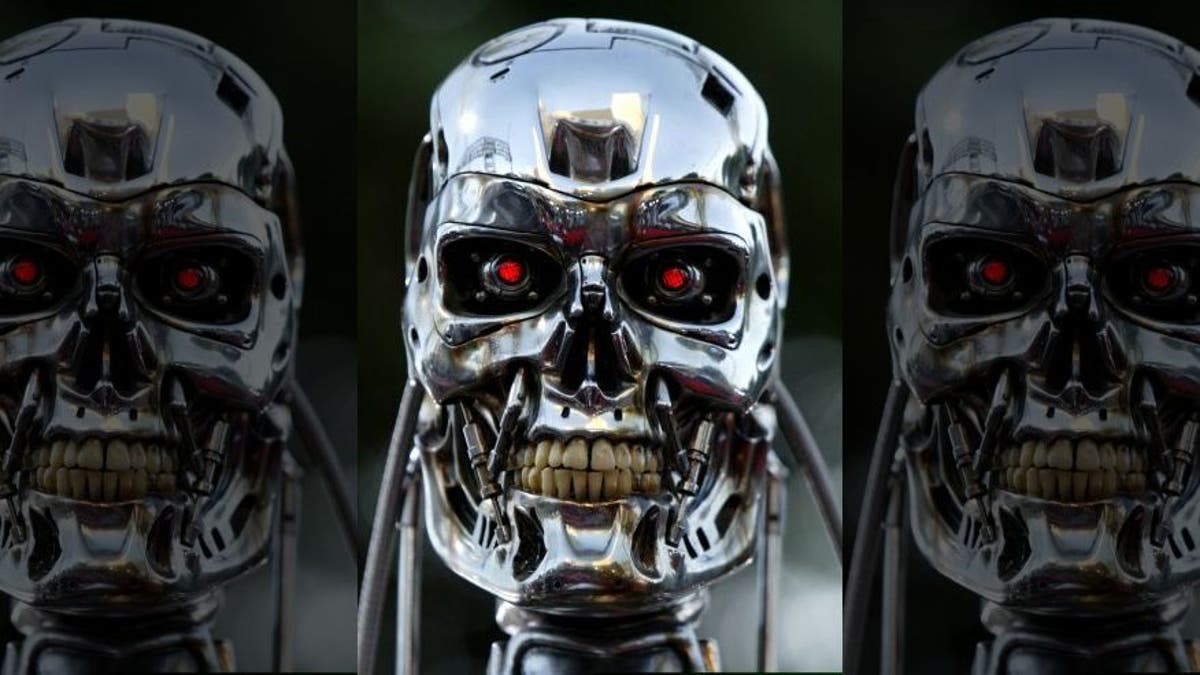
File photo - A robot from the movie is on display for the premier of the motion picture Terminator 3 "Rise of the Machines" June 30, 2003 in west Los Angeles. (REUTERS/Mike Blake)
12 years.
That’s how long Google’s Director of Engineering Ray Kurzweil thinks it will take for computers to reach human levels of intelligence.
Singularity Is Coming
“By 2029, computers will have human-level intelligence,” Kurzweil said in an interview at the SXSW Conference with Shira Lazar and Amy Kurzweil Comix.
HOW AI FIGHTS THE WAR AGAINST FAKE NEWS
Known as the Singularity, the event is oft discussed by scientists, futurists, technology stalwarts and others as a time when artificial intelligence will cause machines to become smarter than human beings.
The time frame is much sooner than what other stalwarts have said, including British theoretical physicist Stephen Hawking, as well as previous predictions from Kurzweil, who said it may occur as soon as 2045.
Softbank CEO Masayoshi Son, who recently acquired ARM Holdings with the intent on being one of the driving forces in the Singularity, has previously said it could happen in the next 30 years.
HOW AI AND TECH COULD STRENGTHEN AMERICA'S BORDER WALL
“I think a big paradigm shift is coming,” Son said in an October press conference, discussing details of his upcoming $100 billion investment fund. “The biggest theme in my view is the Singularity. I think it is coming into reality in the next 30 years. For that vision, I am exercising that strategy. $100 billion is an interesting size of ammunition. In my view, that is the beginning. My passion is bigger than many people think.”
What is the Singularity?
Right now, computers must pass something known as the Turing test (developed by famed British computer scientist Alan Turing) to see if a machine can exhibit behavior in a manner than is equivalent or indistinguishable from a human.
Though many luminaries, including Hawking, Tesla and SpaceX CEO Elon Musk and even Microsoft co-founder Bill Gates have warned about the age of machine learnings and artificial intelligence, Kurzweil isn’t worried.
NEW $27 MILLION FUND AIMS TO SAVE HUMANITY FROM DESTRUCTIVE AI
“That’s not realistic,” Kurzweil said of one artificial intelligence potentially enslaving humanity. “We don’t have one or two AIs in the world. Today we have billions.”
Musk, who has said that humans must merge with machines or risk becoming irrelevant, is working with OpenAI, a non-profit artificial intelligence research company, that is focused on making AI friendly to humanity.
Kurzweil echoed Musk's sentiments, that humans need to converge with machines, pointing out the work already being done in Parkinson's patients.
FOR THE LATEST TECH FEATURES FOLLOW FOX NEWS TECH ON FACEBOOK
“They’re making us smarter,” Kurzweil said during the SXSW interview. "They may not yet be inside our bodies, but, by the 2030s, we will connect our neocortex, the part of our brain where we do our thinking, to the cloud… We’re going to be funnier, we’re going to be better at music. We’re going to be sexier. We’re really going to exemplify all the things that we value in humans to a greater degree.”








































